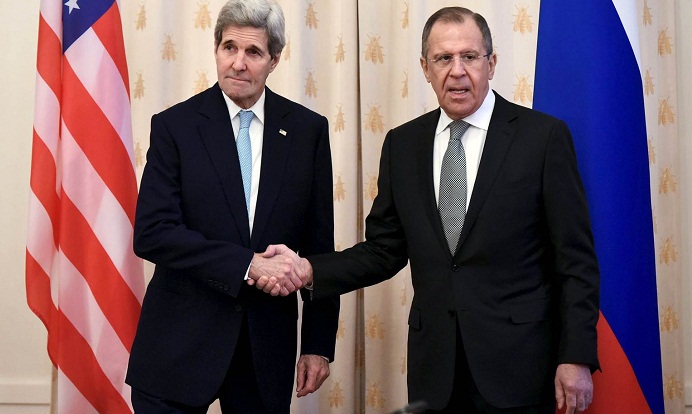Relations between Washington and Moscow have remained stale since early 2014 over what the U.S. perceives as Russian aggression in eastern Ukraine -- where pro-Russian separatists have been fighting Ukraine government troops, at the cost of more than 6,000 lives, according to the United Nations.
Claims and counter claims have been levied as Moscow accuses Washington of supporting "coup" in Ukraine`s capital while American diplomats accuse Moscow of providing military assistance to separatists. The spat has led the U.S. and the EU to impose a number of sanctions against Russia.
But after months of tensions between the two countries, Russian Foreign Minister Sergei Lavrov on Tuesday offered two baskets of potatoes and tomatoes to his American counterpart to soften relations. It was a kind of mutual joke between the two diplomats as Kerry presented Lavrov with two large Idaho potatoes when the pair met for talks on Syria in Paris in early 2014.
During his visit to Tuesday to the Black Sea resort town, Kerry also met with Russian President Vladimir Putin.
"We are in significant agreement on the most important issue of all, which is that [the conflict in Ukraine] will only be resolved by the full implementation of Minsk and all of us have responsibilities to undertake in order to affect that implementation," Kerry said in a statement after the meeting, citing the cease-fire agreement signed in February that included the withdrawal of heavy weapons from combat areas.
A statement from the Russian Foreign Ministry late Tuesday also said the foreign ministers had an "extensive and candid discussion on a wide range of issues of mutual interest.
"Russia is not responsible for the current crisis in relations with the United States. Russia is willing to work constructively with the United States both in bilateral relations and in the world arena, where our countries bear a special responsibility for global security and stability. However, cooperation is possible only on a fair and equitable basis, without any attempts to coerce or dictate to the other side," the statement read.
Despite eight hours of meetings in Sochi, the relationship between the two global powers is unlikely to improve in the near future, says Richard Weitz, an expert on foreign policy, and Russia and central Asia, at the Washington-based think-thank Hudson Institute.
"We’ll see continued cooperation with regard to Iran, except for weapons sales. So I think the Iran talks will be together. On Ukraine, they’re trying to manage it but the differences are fundamental. In Syria, the Russians aren`t willing to make any major concessions, and they’re just going to stick with [Syrian President Bashar] Assad and there is nothing the U.S. can do to change that," he said.
Despite all the differences on the main political issues, "the relationship has stabilized. It won`t get much worse, but I don`t think it will get much better any time soon," Weitz said.
Similarly, James Jay Carafano, an expert on national security and foreign policy challenges, at the Heritage Foundation believes the result of the meeting was "poor".
Russia has not changed its "aggressive" behavior -- a development that can help to improve relations with Washington, said Carafano. "So essentially we are warning the Russians of their behavior."
The relations between Washington and Moscow is still bad since the end of the Cold War and it is very naive for the Obama administration to believe it can significantly improve the relationship by only talking, according to Carafano.
"I think Russians essentially want to follow the Iranian model which is the agreement that you give us something then we will take it."
Despite the sanctions against Russia by the U.S. and its allies, Russia’s economy has not collapsed and Russia still stands firm regarding clashes against the interest of Washington.
President Barack Obama`s administration has less than two years remaining in office and have nothing to offer other than asking the Russians to stop, he said.
Meanwhile, the exchange of potatoes and tomatoes do not seem likely have an affect on any possible relations between the U.S. and Russia in the near future.
More about:
















































